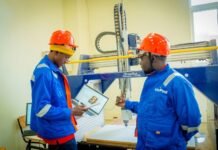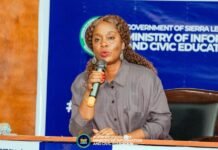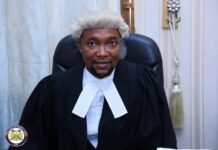By Alvin Lansana Kargbo
Bernard Hein, Regional Director of the International Fund for Agricultural Development (IFAD), on November 4, 2024 delivered a compelling statement today at the National Climate Resilience and Just Inclusive Energy Transition Dialogue, acknowledging the pivotal role of agriculture and rural development in Sierra Leone’s National Development Plan and the Feed Salone initiative.
Hein praised President Julius Maada Bio for placing agriculture at the forefront of the country’s development strategy, highlighting that sustainable transitions out of poverty are fundamentally tied to agricultural productivity. He pointed out that, in Sub-Saharan Africa, the agricultural sector is eleven times more effective at reducing poverty compared to other sectors.
Reflecting on the challenges faced by rural communities, Hein emphasized the urgent need for energy services, noting that over 570 million people in Sub-Saharan Africa live without electricity, with the majority residing in rural areas. He stressed that small-scale farmers require reliable energy not only for daily tasks but also to enhance agricultural productivity and reduce post-harvest losses. The absence of adequate energy services, he warned, keeps communities trapped in a cycle of food insecurity and environmental degradation.
As the only International Financial Institution dedicated solely to rural areas, IFAD is increasingly incorporating renewable energy technologies into its initiatives. Hein shared successful examples from various countries, such as the use of bio digesters in Mali, which have converted livestock methane into biogas for 5,000 households, significantly reducing wood consumption and carbon emissions.
He also highlighted projects in Nigeria, where organic waste from cassava processing is being transformed into biofuel, and the implementation of solar-powered irrigation systems across several African nations, including Sierra Leone. These innovations have drastically lowered operational costs for agricultural cooperatives and improved their economic viability.
The Regional Director underscored that investments in renewable energy are essential not only for enhancing agricultural competitiveness but also for attracting youth to the sector by making agriculture a viable business. He cited Turkey’s initiatives in solar energy as an example of how comprehensive energy solutions can drive rural development and reverse migration trends, allowing young people to thrive in their communities.
Hein’s key message reiterated the necessity for a reliable and sustainable energy supply to support agricultural resilience and food security. He expressed IFAD’s commitment to the Feed Salone Initiative and its collaborative approach with the Sierra Leone government to leverage global learnings in renewable energy and rural infrastructure development.
Looking ahead, Hein announced a forthcoming agreement with Sierra Leone’s Finance and Agriculture Ministers to co-finance a USD 105 million livestock project aimed at transforming the sector while addressing greenhouse gas emissions responsibly.
In closing, Hein reaffirmed IFAD’s dedication to working with the Sierra Leone government and development partners to eliminate hunger and promote food security, stating, “It is our collective obligation at the heart of the 2030 Agenda.” He called for bold actions and collaborative efforts to realize these vital goals.
“Thank you for your attention,” he concluded, expressing gratitude for the opportunity to engage in this crucial dialogue.




